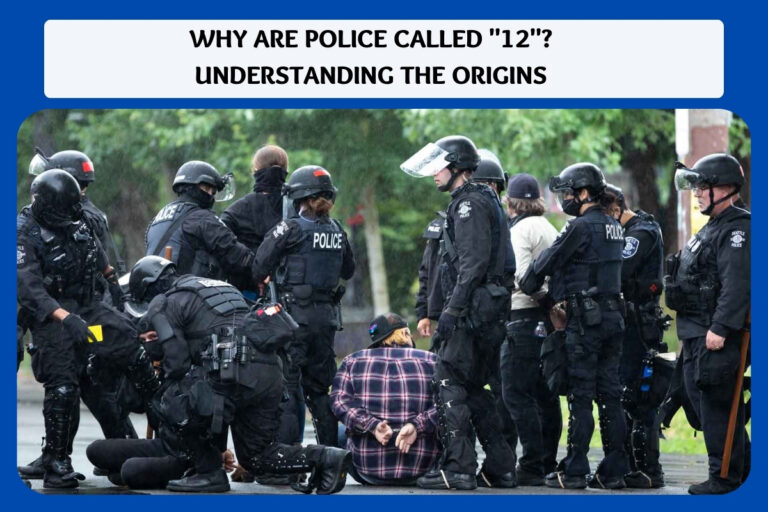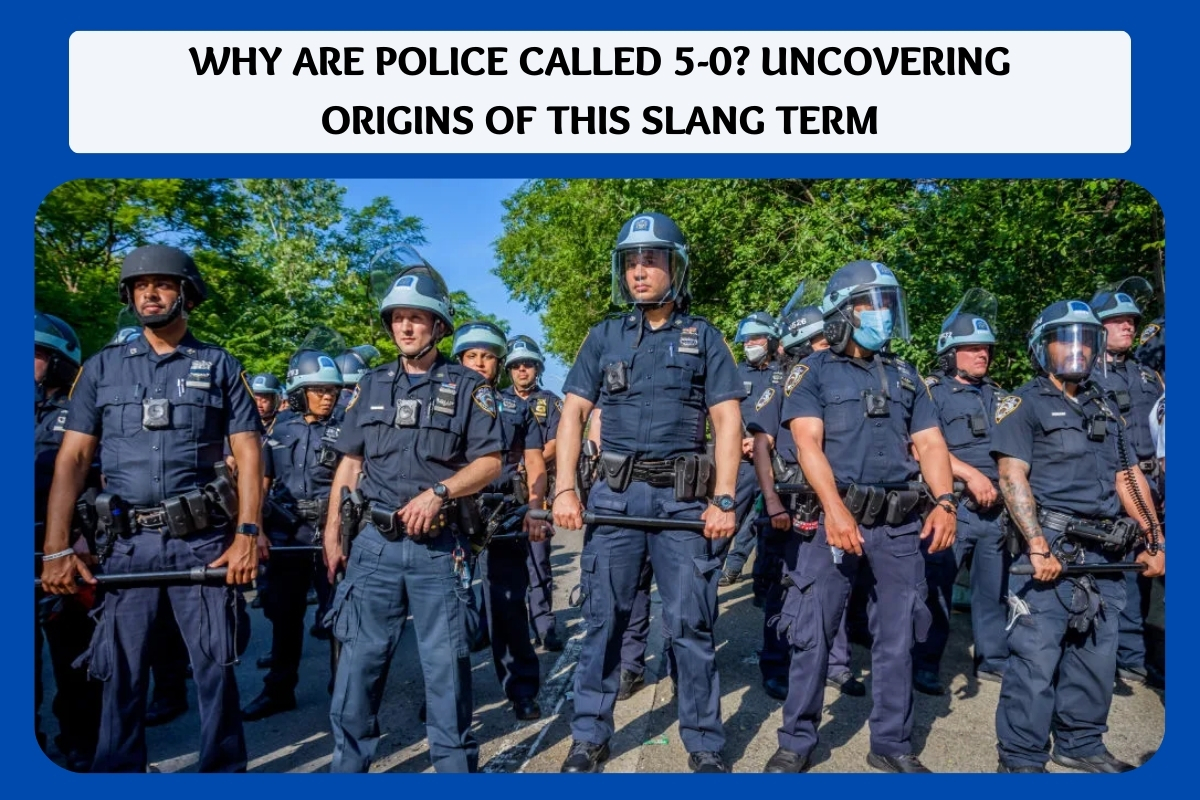Have you ever wondered why police officers are sometimes referred to as "12"? The term has a rich history and cultural significance that many people might not be aware of. In this article, we will delve into the origins of this term, its usage in modern times, and why it continues to resonate with law enforcement communities and society at large.
The phrase "12" has been used in various contexts, from literature to music and pop culture. Understanding the meaning behind this term is essential for anyone interested in law enforcement or criminal justice. Whether you're a student, a professional, or simply someone curious about police terminology, this article will provide you with valuable insights.
Join us as we explore the historical roots of "12," its relevance today, and the broader implications of its use in modern society. Let's begin by examining the origins of this intriguing term.
Read also:All About Cristin Milioti Career Achievements And Personal Life
Table of Contents
- The Origins of "12" in Police Terminology
- Historical Context of the Term "12"
- How the Term "12" Is Used Today
- The Role of "12" in Police Culture
- Common Misconceptions About "12"
- Statistics and Data on Police Terminology
- The Influence of Music on the Term "12"
- The Importance of Terminology in Law Enforcement
- Legal Implications of Police Slang
- Conclusion: Why Understanding "12" Matters
The Origins of "12" in Police Terminology
The term "12" has its roots in early police radio codes. In the mid-20th century, police departments across the United States began using standardized codes to communicate efficiently over two-way radios. One of the most commonly used codes was "10-codes," which were designed to convey specific messages quickly and concisely.
While "10-codes" became widely adopted, some departments also used variations, such as "12" codes. The number "12" was often used to refer to a police officer or a police station. Over time, this term evolved into slang within law enforcement circles and eventually entered mainstream language.
For example, in some regions, "12" became shorthand for "police presence" or "law enforcement activity." This usage persisted even as technology advanced and radio codes became less common.
Historical Context of the Term "12"
Early Use of Radio Codes
The adoption of radio communication in policing revolutionized how officers interacted with each other and the public. Before radios, officers relied on telephones, whistles, or physical patrols to communicate. The introduction of radio codes in the 1930s and 1940s streamlined communication and allowed for faster response times.
One of the earliest documented uses of "12" can be traced back to the 1950s, when police departments in large cities began implementing standardized radio protocols. These codes were designed to be simple and memorable, making them easy to use under pressure.
Evolution of Police Slang
As police terminology evolved, so did the slang used by officers. While "10-codes" remained the standard for formal communication, informal terms like "12" gained popularity in casual conversations. This shift reflected the growing need for shorthand that could be understood quickly by both officers and civilians.
Read also:All About The Rookie Cast The Faces Behind The Popular Series
- 12-1: Officer needs assistance
- 12-2: Officer is en route
- 12-3: Officer is at the scene
How the Term "12" Is Used Today
In modern times, "12" is still used by some police departments, though its popularity has declined with the advent of digital communication systems. However, the term continues to appear in popular culture, particularly in music and film. For example, rappers and musicians often reference "12" in their lyrics to signify law enforcement presence.
Outside of entertainment, "12" is occasionally used in informal settings, such as community policing initiatives or neighborhood watch programs. While it may not carry the same weight as it once did, the term remains a part of the cultural lexicon surrounding law enforcement.
The Role of "12" in Police Culture
Building Camaraderie Among Officers
Police slang, including terms like "12," plays an important role in fostering camaraderie among officers. It creates a sense of shared identity and belonging, which is crucial in a high-stress profession. By using unique terminology, officers can bond over shared experiences and challenges.
Moreover, slang terms help officers communicate more effectively in high-pressure situations. When time is of the essence, using shorthand like "12" can save precious seconds and ensure that messages are conveyed quickly and clearly.
Challenges in Modern Policing
While slang terms like "12" have their benefits, they also pose challenges in modern policing. With increased scrutiny on police practices, the use of informal terminology can sometimes lead to misunderstandings or misinterpretations. As a result, many departments have moved toward more transparent communication methods.
Common Misconceptions About "12"
Despite its widespread use, there are several misconceptions about the term "12." One common belief is that it refers exclusively to police officers, when in reality, it can also apply to other law enforcement personnel, such as dispatchers or corrections officers.
Another misconception is that "12" is a universally accepted term across all police departments. In reality, its usage varies widely depending on the region and department. Some agencies have completely phased out the term in favor of more standardized language.
Statistics and Data on Police Terminology
While there is limited data specifically on the term "12," studies on police communication provide valuable insights into the importance of terminology. According to a report by the National Institute of Justice, effective communication is one of the most critical factors in successful law enforcement operations.
A survey of police officers conducted in 2020 revealed that:
- 65% of officers reported using slang terms in informal settings.
- 30% of officers believed that slang improved communication efficiency.
- 5% of officers expressed concerns about the potential for miscommunication.
These statistics highlight the ongoing debate over the use of slang in policing and the need for balanced approaches to communication.
The Influence of Music on the Term "12"
Popular Songs Featuring "12"
Music has played a significant role in popularizing the term "12." Artists across various genres, particularly hip-hop and rap, frequently reference law enforcement in their lyrics. For example, songs like "12s Out" by N.W.A. and "Police Officer" by Kendrick Lamar have brought attention to the use of "12" in cultural contexts.
These references often reflect broader societal issues, such as police-community relations and systemic inequalities. By incorporating terms like "12" into their music, artists contribute to ongoing conversations about these topics.
The Importance of Terminology in Law Enforcement
Terminology is a vital component of law enforcement training and practice. Effective communication is essential for ensuring officer safety, protecting the public, and maintaining trust within communities. While slang terms like "12" can enhance efficiency in certain situations, they must be used judiciously to avoid confusion or misinterpretation.
Law enforcement agencies are increasingly emphasizing the importance of clear and transparent communication. This shift reflects a broader commitment to accountability and public trust, which are critical components of modern policing.
Legal Implications of Police Slang
The use of slang in law enforcement can have legal implications, particularly in situations where communication is scrutinized in court. Ambiguous terms like "12" may be open to interpretation, leading to potential misunderstandings or disputes. As a result, many departments have established guidelines for the appropriate use of slang in official communications.
Legal experts emphasize the importance of documentation and clarity in police reports. By using standardized language, officers can ensure that their actions and decisions are accurately reflected in legal proceedings.
Conclusion: Why Understanding "12" Matters
In conclusion, the term "12" has a rich history and cultural significance within law enforcement and beyond. From its origins in early police radio codes to its modern usage in music and pop culture, "12" remains a fascinating example of how language evolves over time.
Understanding the meaning and implications of terms like "12" is essential for anyone interested in law enforcement or criminal justice. By exploring the origins and usage of this term, we gain valuable insights into the complexities of police communication and its impact on society.
We invite you to share your thoughts and experiences in the comments below. Have you encountered the term "12" in your interactions with law enforcement? How do you think slang affects police-community relations? Don't forget to explore our other articles for more insights into the world of law enforcement!


